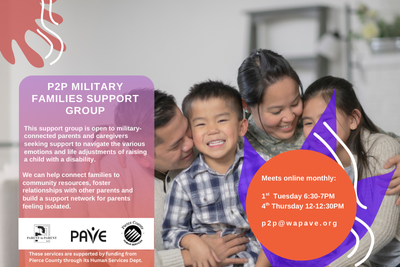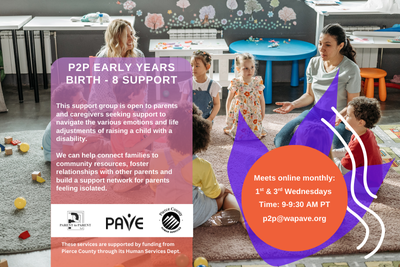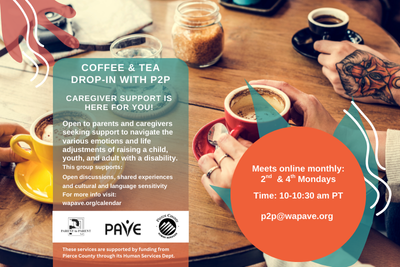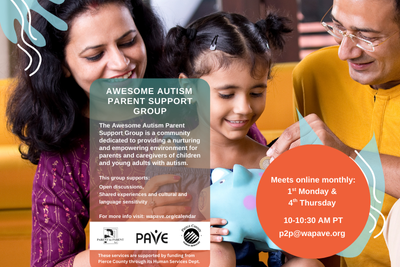A Brief Overview
- Autism Spectrum Disorder (ASD) is a spectrum condition with varied signs and symptoms. It involves challenges in multiple areas, including social skills, emotional regulation, communication, and behavior.
- ASD can appear differently from one person to the next, and as a child develops from infancy through adulthood. Families concerned about a child’s development can call the state’s Family Health Hotline at 1-800-322-2588. This toll-free number offers help in English, Spanish and other languages.
- Parents of infants and toddlers aged 0-3 with developmental concerns may benefit from the services provided by the Early Support for Infants and Toddlers (ESIT) program, which provides specialized services and support that are crucial during the early and highly formative years of a child’s life.
- Students with ASD may qualify for school-based services through an Individualized Education Program (IEP) if their disability significantly impacts educational access. These services are determined through evaluations that can include various related conditions. A medical diagnosis is not required for school-based evaluations or interventions.
- The Developmental Disabilities Administration (DDA) accepts diagnoses from Autism Centers of Excellence (COEs) as a component of DDA services eligibility, with the exception of naturopathic providers.
- Connecting with other families to share and learn from experiences is invaluable, and there is a wealth of resources available to assist those seeking support and information in Washington State. Parent to Parent (P2P) programs across various counties provide free training and support, with support groups tailored to cultural and linguistic communities such as Spanish-speaking and Black & African American families.
- PAVE provides support to families navigating various healthcare systems related to disability. Fill out a Helpline Request for direct support and click on the “Health and Wellness” link to be directed with individual support.
Full Article
Parents of individuals with autism have many different experiences when watching their child’s development, navigating school years and relationships, and building community and belonging. When developmental milestones aren’t met in typical timeframes, families may seek a diagnosis, medical interventions, and/or support from school.
CDC numbers show that 1 in 36 children have ASD and 2.8% of 8-year-old children have a diagnosis of ASD. According to Washington’s Department of Health (DOH), between 23,000-48,000 of the state’s children have some form of diagnosed ASD.
April is Autism Acceptance Month, providing an opportunity to consider challenges and celebrations for individuals who experience neurodiversity, which is a word used to capture a range of differences in the ways that humans function and experience the world. Much of the Autistic community rallies to honor neurodiversity, uplift the voices of self-advocates, and forward the movement of civil and social rights.
To promote dignity, neurodiversity, and empowerment, many autistic self-advocates prefer identity-first language, such as “autistic person” instead of person-first language like “person with autism”. This approach recognizes autism as an integral and inseparable part of an individual’s identity.
What is Autism Spectrum Disorder (ASD)?
Autism Spectrum Disorder (ASD) is referred to as a “spectrum”, which means that signs and symptoms vary among individuals. The Centers for Disease Control and Prevention (CDC) defines Autism Spectrum Disorder (ASD) as “a developmental disability that can cause significant social, communication and behavioral challenges.
“There is often nothing about how people with ASD look that sets them apart from other people, but people with ASD may communicate, interact, behave, and learn in ways that are different from most other people. The learning, thinking, and problem-solving abilities of people with ASD can range from gifted to severely challenged. Some people with ASD need a lot of help in their daily lives; others need less.”
A diagnosis of ASD includes several conditions that were formerly diagnosed separately, including autistic disorder, pervasive developmental disorder not otherwise specified (PDD-NOS), and Asperger syndrome. A short YouTube video by Osmosis.org provides an overview of ASD.
Autism Indicators and Markers Across the Lifespan
People with ASD may struggle with social, emotional, and communication skills. They might repeat certain behaviors or have rigid ideas about routines. Indicators of ASD often begin during early childhood and typically last throughout life. Professor and autism self-advocate, Dr. Stephen Shore said, “If you’ve met one person with autism, you’ve met one person with autism.” ASD can appear differently from one person to the next, and as a child develops from infancy through adulthood. There are services and supports available at each stage of development and life.
Early Childhood Indicators and Supports
The American Academy of Pediatrics recommends that all children have a developmental screening at every well-child check-up, with an autism screening at 18 months of age and again between ages 2 and 3. To encourage early screening and intervention, the CDC provides developmental milestone trackers for children Birth-5, including a Milestone Tracker App. State-specific information about early screening recommendations and guidance is available from the Washington Department of Health (DOH). Families concerned about a child’s development can call the state’s Family Health Hotline at 1-800-322-2588. This toll-free number offers help in English, Spanish and other languages.
Some early childhood indicators of ASD include:
- Not pointing at objects, such as an airplane flying overhead, or looking when someone else points
- Not wanting to be held or cuddled
- Repeating or echoing words, phrases, or actions
Several state agencies collaborated to publish Early Learning and Development Guidelines. The booklet includes information about what children can do and learn at different stages of development, focused on birth through third grade. A free downloadable version is available in English, Somali, and Spanish on the Washington State Department of Children, Youth & Families (DCYF) website. An English translation is also available on the Office of the Superintendent of Public Instruction (OSPI) Early Learning Resources page.
Parents of infants and toddlers aged 0-3 with developmental concerns may benefit from the services provided by the Early Support for Infants and Toddlers (ESIT) program, which provides specialized services and support that are crucial during the early and highly formative years of a child’s life. Early intervention services through ESIT not only supports the child’s immediate developmental needs but also lays a foundation for their future learning and adaptation. ESIT provides the following:
Early Evaluation and Identification: ESIT helps in the early identification of developmental delays or disabilities, including autism, through assessments conducted by a team of professionals. These evaluations focus on key developmental areas such as motor skills, cognition, communication, social interaction, and self-help skills. Early diagnosis is crucial for autism, as it can lead to early intervention, which is shown to improve outcomes.
Services and Supports: Once a child is evaluated and deemed eligible, they receive an Individualized Family Service Plan (IFSP) under Part C of the Individuals with Disabilities Education Act (IDEA). This plan is tailored to meet the unique developmental needs of the child and also considers the family’s resources, priorities, and concerns. The IFSP includes detailed information on the child’s current development levels, the specific interventions planned, and the expected outcomes. Through ESIT, children can access a wide range of early intervention services designed to address specific developmental needs associated with ASD.
Family-Centered Approach: The family plays a crucial role in the development and implementation of the IFSP. Family Resource Coordinators (FRCs) assist families in understanding their child’s needs, the available services, and the implementation of the intervention plan. This inclusive approach ensures that the family’s needs and goals are addressed, promoting a supportive environment for the child.
The ESIT website includes videos to guide family caregivers and a collection of Parent Rights and Leadership resources, with multiple language options.
Parents may also contact their local school district for evaluation. Regardless of whether a student is medically diagnosed with ASD, a school district has the affirmative duty to seek out, evaluate and serve—if eligible—any child within its boundaries who has a known or suspected disability condition that may significantly impact access to learning (Child Find Mandate). Child Find applies to IDEA’s Part B IEP services for children ages 3-21 and to IDEA’s Part C early intervention services for children Birth-3. See PAVE’s article about early intervention services for more information.
Supporting a Student with ASD
Children and youth in adolescence may demonstrate the following characteristics of ASD:
- Avoiding eye contact or making excessive eye contact
- Uncertainty in understanding what facial expressions or tones of voice mean
- Not understanding sarcasm, figures of speech, or metaphors
Autism is an eligibility category for a student to receive school-based services through an Individualized Education Program (IEP). The categories are defined by the federal Individuals with Disabilities Education Act (IDEA). State law further defines the categories and criteria for intervention.
The Washington Administrative Code that describes IEP eligibility (WAC 392-172A-01035) describes autism as “a developmental disability significantly affecting verbal and nonverbal communication and social interaction, generally evident before age three, that adversely affects a student’s educational performance. Other characteristics often associated with autism are engagement in repetitive activities and stereotyped movements, resistance to environmental change or change in daily routines, and unusual responses to sensory experiences.”
Schools have specific evaluation tools to determine how the features of an autistic disorder might impact school. Evaluations can also determine eligibility based on health impairments (for example, ADHD), speech delays, learning disabilities, or emotional behavioral conditions that might co-occur with autism. See PAVE’s article about evaluation process for more information, including a list of all IDEA eligibility categories.
In short, a student is eligible for an Individualized Education Program (IEP) if the evaluation determines:
- The student has a disability
- The disability significantly impacts access to education
- The student requires Specially Designed Instruction (SDI) and/or Related Services
Not every student with ASD is eligible for school-based services through an IEP. Some may have “major life activity” impacts to qualify for a Section 504 Plan, which can accommodate a student within general education. Section 504 provides anti-discrimination protections as part of the Rehabilitation Act of 1973. Keep in mind that students with IEPs have disability-related protections from IDEA and Section 504. Additional protections are part of the Americans with Disabilities Act (ADA). See PAVE’s article about disability history for additional information.
A diagnosis is not required to provide special education or related services. If the school district requires a comprehensive medical evaluation, they may request permission from the parent to have the child evaluated at the district’s expense (WAC 392-172A-03020).
Where to Begin to Obtain Supports
Families whose children experience autism may need services beyond school. Speech, Occupational Therapy, Applied Behavioral Analysis (ABA) therapies, and other services may be available through insurance if they are determined to be medically necessary. The state Health Care Authority provides information about ABA resources and how to seek approval from public insurance (Apple Health) for specific therapies. HCA also hosts a list of Contracted ABA providers in Washington State.
Diagnosing ASD can be difficult since it can appear differently from one person to another, and indicators change depending on the chronological and developmental age of the individual. Doctors look at the person’s behavior and development to make a diagnosis. The diagnostic process usually takes a while, lasting years in some cases. In addition to working through insurance and health systems, you may encounter barriers when identifying providers who can diagnose within the age range of the individual.
Medical diagnoses in Washington are provided by Autism Centers of Excellence (COEs). An Autism COE may be a health care provider, medical practice, psychology practice, or multidisciplinary assessment team that has completed a certification training authorized by the state’s Health Care Authority (HCA). Physicians, nurse practitioners, and pediatric primary care naturopaths are eligible to apply for COE training and endorsement. The Developmental Disabilities Administration (DDA) accepts diagnoses from COEs as a component of DDA services eligibility, with the exception of naturopathic providers.
Locate screening and diagnostic services in your location at ParentHelp123. If insurance doesn’t cover the full cost of diagnosis, check with the diagnostician to identify sliding scale or other payment options.
PAVE provides support to families navigating various healthcare systems related to disability. Fill out a Helpline Request for direct support and click on the “Health and Wellness” link to be directed with individual support.
Building Community Connections
Connecting with other families to share and learn from experiences is invaluable, and there is a wealth of resources available to assist those seeking support and information in Washington State. These resources include various programs and organizations tailored to meet specific needs, with some services focusing on race, cultural identity, and language. By tapping into these resources, families and individuals can find not only support but also a sense of belonging within a community that understands their unique challenges and perspectives.
Parent to Parent (P2P) of Pierce County, a program of PAVE, partners with Pierce County Human Services and The Arc of Washington State to provide No Cost training and support. PAVE’s Pierce “Parent 2 Parent Support Groups” offers a nurturing space for caregivers to connect, share experiences, and find guidance. Support groups specific to a cultural and linguistic community (Spanish-speaking, and Black & African American families) will be supported by a PAVE facilitator that is a cultural/linguistic match for the families served.
Parent to Parent (P2P) programs across various counties provide free training and support, with support groups tailored to cultural and linguistic communities such as Spanish-speaking and Black & African American families. P2P of Yakima, Walla Walla, Chelan/Douglas, Benton/Franklin, Skagit, Snohomish, Whatcom, Grays Harbor/Pacific, Clark, Klickitat, Lewis, Skamania, and Grant counties provide Spanish-speaking support, events, and resources. P2P King County supports Spanish-speaking and African American families.
Informing Families provides navigational supports for all ages, including referral to culturally responsive programs and services, such as Vietnamese Family Autism Advisory Board (VFAAB), Odessa Brown Children’s Clinic (OBCC), and Families of Color Seattle (FOCS).
The South Sound Autism Partnership is a collaborative network dedicated to raising awareness, acceptance, and advocacy for autism. SSAP aims to support and enact positive change within the community through monthly online meetings. Recordings of guest speakers at previous meetings and meeting notes are available on the SSAP website.
Additional Resources
The downloadable Autism Guidebook for Washington State, published by a dedicated Autism Task Force in collaboration with the DOH and other agencies, offers a comprehensive resource for families, educators, medical professionals, and care providers. It features a detailed Autism Lifespan Resource Directory, diagnostic and special education eligibility criteria, and recommended intervention.
Another guidebook, the Pierce County Parent Coalition (PC2) Resource Guide, contains clickable and searchable links to services throughout the state.
The University of Washington Autism Center provides a manageable place to begin with a small collection of resource categories that include online tools, early recognition, organization, and neurodiversity. Within its online tools, UW maintains lists of organizations that provide advocacy, assessments, intervention services, and research/training.
Washington Autism Alliance (WAA) provides free support for families navigating insurance and medical systems and can help with DDA applications. WAA’s website requests families to join the agency by providing basic information before they navigate to request an intake. Note that while basic services are free from WAA, the agency may charge a fee based on a sliding scale if families request legal services from an attorney.
The Autistic Self Advocacy Network (ASAN) shares resources by autistic individuals with lived experience for people who have autism spectrum disorders, including a welcome kit for newly diagnosed individuals: Welcome to the Autistic Community!
The DOH website links to family supports and services for individuals of all ages, including links to Regional Genetic Clinics.





